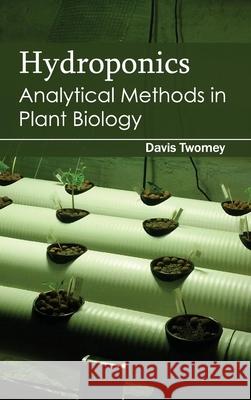Hydroponics: Analytical Methods in Plant Biology » książka
Hydroponics: Analytical Methods in Plant Biology
ISBN-13: 9781632394279 / Angielski / Twarda / 2015 / 258 str.
The origin of the word Hydroponic lies in Latin and it literally means working water. This book presents the readers with an insight into the necessities and methods which need to be taken into account to yield better crop outcomes in hydroponics. The book mainly stresses on facts like making of hydroponic nutrient mixture, application of these methods for studying biological approaches and ecological restrains, and production of vegetables and ornamentals hydroponically. The book begins with a general discussion on the nutrient blend used for hydroponics and goes forward describing the vitro hydroponic culture method for vegetables. The book also encompasses an elaborated study about the functions of hydroponics in the framework of analytic discoveries in plant responses and bearings to abiotic stresses and on the issues related to the reuse of culture mixtures and ways to overcome them. It gives knowledge about the functions of hydroponic schemes in examining plant-microbe-ecological communications and in varied approaches of plant biological studies, understanding of root uptake of nutrients and use of hydroponics in environmental cleansing of harmful and polluting elements. It also provides an overview of the hydroponic production of cactus and fruit tree seedlings. This book is a compilation of the world's most valuable research works. Therefore, it will prove to be an accountable source of information to education institutes, scientists and majority of students studying biological science and crop production.
The origin of the word Hydroponic lies in Latin and it literally means working water. This book presents the readers with an insight into the necessities and methods which need to be taken into account to yield better crop outcomes in hydroponics. The book mainly stresses on facts like making of hydroponic nutrient mixture, application of these methods for studying biological approaches and ecological restrains, and production of vegetables and ornamentals hydroponically. The book begins with a general discussion on the nutrient blend used for hydroponics and goes forward describing the vitro hydroponic culture method for vegetables. The book also encompasses an elaborated study about the functions of hydroponics in the framework of analytic discoveries in plant responses and bearings to abiotic stresses and on the issues related to the reuse of culture mixtures and ways to overcome them. It gives knowledge about the functions of hydroponic schemes in examining plant-microbe-ecological communications and in varied approaches of plant biological studies, understanding of root uptake of nutrients and use of hydroponics in environmental cleansing of harmful and polluting elements. It also provides an overview of the hydroponic production of cactus and fruit tree seedlings. This book is a compilation of the worlds most valuable research works. Therefore, it will prove to be an accountable source of information to education institutes, scientists and majority of students studying biological science and crop production.











